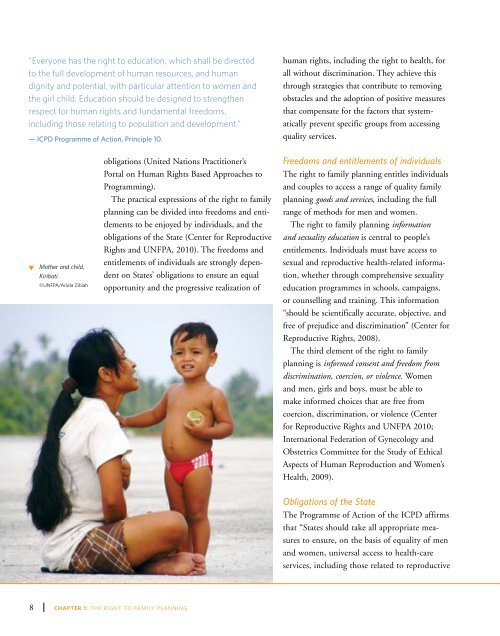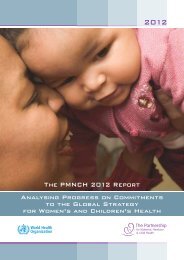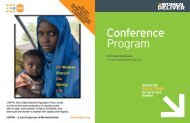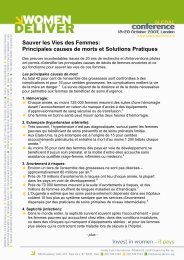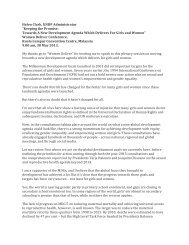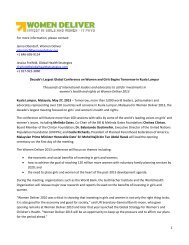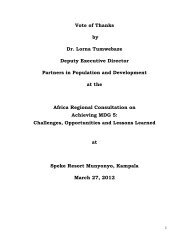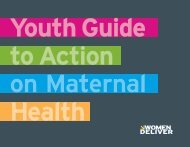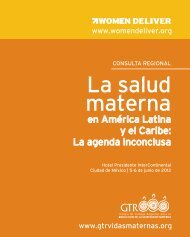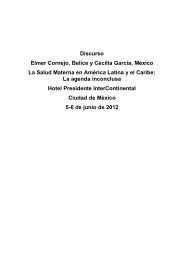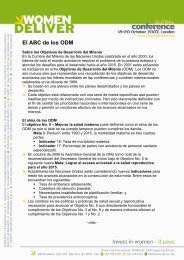State of World Population 2012 - UNFPA Haiti
State of World Population 2012 - UNFPA Haiti
State of World Population 2012 - UNFPA Haiti
You also want an ePaper? Increase the reach of your titles
YUMPU automatically turns print PDFs into web optimized ePapers that Google loves.
“Everyone has the right to education, which shall be directedto the full development <strong>of</strong> human resources, and humandignity and potential, with particular attention to women andthe girl child. Education should be designed to strengthenrespect for human rights and fundamental freedoms,including those relating to population and development.”— ICPD Programme <strong>of</strong> Action, Principle 10.human rights, including the right to health, forall without discrimination. They achieve thisthrough strategies that contribute to removingobstacles and the adoption <strong>of</strong> positive measuresthat compensate for the factors that systematicallyprevent specific groups from accessingquality services.t Mother and child,Kiribati.©<strong>UNFPA</strong>/Ariela Zibiahobligations (United Nations Practitioner’sPortal on Human Rights Based Approaches toProgramming).The practical expressions <strong>of</strong> the right to familyplanning can be divided into freedoms and entitlementsto be enjoyed by individuals, and theobligations <strong>of</strong> the <strong>State</strong> (Center for ReproductiveRights and <strong>UNFPA</strong>, 2010). The freedoms andentitlements <strong>of</strong> individuals are strongly dependenton <strong>State</strong>s’ obligations to ensure an equalopportunity and the progressive realization <strong>of</strong>Freedoms and entitlements <strong>of</strong> individualsThe right to family planning entitles individualsand couples to access a range <strong>of</strong> quality familyplanning goods and services, including the fullrange <strong>of</strong> methods for men and women.The right to family planning informationand sexuality education is central to people’sentitlements. Individuals must have access tosexual and reproductive health-related information,whether through comprehensive sexualityeducation programmes in schools, campaigns,or counselling and training. This information“should be scientifically accurate, objective, andfree <strong>of</strong> prejudice and discrimination” (Center forReproductive Rights, 2008).The third element <strong>of</strong> the right to familyplanning is informed consent and freedom fromdiscrimination, coercion, or violence. Womenand men, girls and boys, must be able tomake informed choices that are free fromcoercion, discrimination, or violence (Centerfor Reproductive Rights and <strong>UNFPA</strong> 2010;International Federation <strong>of</strong> Gynecology andObstetrics Committee for the Study <strong>of</strong> EthicalAspects <strong>of</strong> Human Reproduction and Women’sHealth, 2009).Obligations <strong>of</strong> the <strong>State</strong>The Programme <strong>of</strong> Action <strong>of</strong> the ICPD affirmsthat “<strong>State</strong>s should take all appropriate measuresto ensure, on the basis <strong>of</strong> equality <strong>of</strong> menand women, universal access to health-careservices, including those related to reproductive8 CHAPTER 1: THE RIGHT TO FAMILY PLANNING


